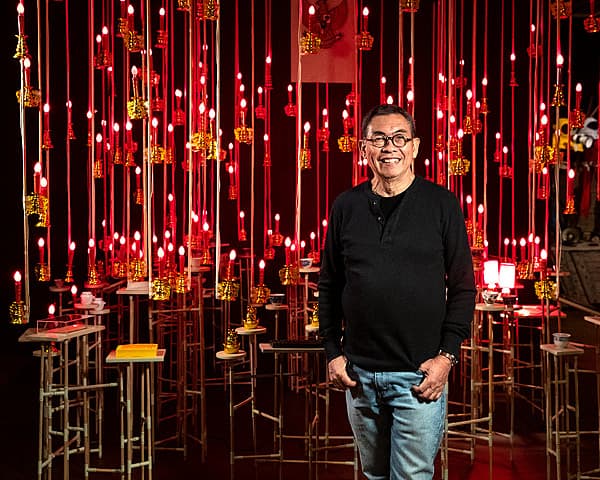FX Harsono
FX Harsono’s art is about personal and collective identity and issues of justice and injustice within Indonesia. A sixth-generation descendant of Chinese immigrants he also has Javanese ancestry. The Chinese minority has long suffered discrimination in Indonesia, initially by Dutch colonialists and later under the New Order regime of President Suharto who banned Chinese festivals and ceremonies as well as the use of the Chinese language. Harsono explored this loss of his culture in Writing in the rain 2009, an iconic video in which the artist struggles in vain to write his name in Chinese characters as they are continuously washed away.
In the mid-1970s Harsono was a co-founder of the New Art Movement and since then has been at the forefront of the few courageous advocates for human rights who have aimed to give a voice to the powerless. During the New Order, Harsono used compelling symbols in his art such as bloodstained cloths and coils of barbed wire, as in Power and oppression 1992–93, and wayang masks sawn off at the mouth to indicate the silencing of dissent in The voices controlled by the powers 1994. During social turmoil in 1998 many Chinese Indonesians were attacked by mobs. Harsono responded with a series of works related to these events and Chinese identity.
Since 2009, inspired in part by a collection of old black-and-white photographs taken by his father, Harsono’s works have explored issues such as the killings of ethnic Chinese Indonesians between 1947–49 during violent unrest in the context of Indonesia’s struggle for independence. Gazing on collective memory 2016 is a poignant installation referring to the tragic history of the Chinese in Indonesia. The seemingly fragile work consists of a cluster of spindly wooden stands that support memorabilia including photographic portraits, delicate porcelain offering bowls and school books. Hundreds of electric candles hover over this assemblage, casting a warm golden light and alluding to the resilience of individuals and communities who are damaged by, but survive, a brutal history.
The end of Suharto’s New Order enabled the emergence of a genuinely democratic political system in Indonesia, but Harsono has continued to advocate for a truer version of history so that younger generations might learn from the failures of the past to create a more inclusive society for all Indonesians.
Dr Caroline Turner and Carol Cains

FX Harsono
